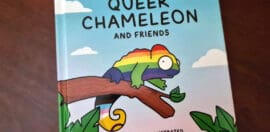Doco of the Month: Visible Farmer

26 November 2019 at 8:40 am
Gisela Kaufmann and Carsten Orlt talk to Wendy Williams about how their new web-series is putting a spotlight on the long hidden face of agriculture, as part of a series profiling powerful documentaries in partnership with Documentary Australia Foundation.
Picture a farmer. What do you see?
Be honest. Is it a man?
Grain and sheep farmer Nicole Batten, says if you Google an image of a farmer you will most likely find a middle- to older-age man, who is hanging on to his dog.
“You would find more dogs than you would women,” she says.
It’s not just a question of gender stereotypes, until surprisingly recently it was a legal issue too.
Before 1994, Australian women could not legally claim to be farmers.
They were “domestics”, “helpmates”, “farmers’ wives”…
“Women have every right to stand up there next to the men and do it.”
Yet, nearly half of all food in Australia is produced by women.
A unique documentary series is hoping to introduce you some of those women and put a spotlight on two pressing issues: gender equality and food security.
Visible Farmer is the brainchild of Gisela Kaufmann and Carsten Orlt who describe themselves as “story farmers”.
The 15-part web-series, which launched in August with a new film released each fortnight, takes you on a journey, from remote outback stations to urban market gardens, to reveal some of the untold stories of the women behind our food and change perceptions of who a farmer is.
Each episode shows a different woman, and the collection is as diverse as the industry the women are working in and the challenges they face.
Director Kaufmann says it was about time to go out there and find these women and tell their stories.
“It’s really about acknowledging the women who are out there and don’t just claim that role, but fulfil that role,” she says.
She says making it known that women could not legally claim to be farmers until 1994 has already got people talking.
“That was one of the facts that got us straight into it,” Kaufmann says.
“You think it’s something from the 1950s.”
Not even women in agriculture were really aware of the fact, producer Orlt says.
It was a question of legality. It did not have a bearing on census data but would come into play in accidents or work insurance claims.
“The women themselves were surprised by it. Because they never saw themselves not being equal,” he says.
The pair point out that farming is very different to many jobs that people in the cities might have where you and your partner each go to work and then return home at the end of the day to talk about it – with farming you live it.
“Most of these farms are family businesses. You and your husband or partner run the place and you work together 24/7. Every decision has that dynamic,” Orlt says.
Speaking in the first episode, cattle farmer Debbie Dowden stresses that women are vital to those parts of the country.
“And women have every right to stand up there next to the men and do it. And just never let anybody tell you that you shouldn’t be in that role because you absolutely should, absolutely,” she says.
But Kaufmann says, while all the women will tell you the sector is changing, and progress has been made since the nineties, the industry is still behind – particularly when you look at the number of women in leading positions.
Only 2.3 per cent of CEOs in Australian agribusinesses are female, compared with an average of 17 per cent across other industries.
Kaufmann and Orlt can recall countless stories from women that show discrimination is commonplace.
“So many times, women have told us about when they are at the farmer’s market and they’re selling, and a six-year-old asks ‘where’s the farmer?’” Orlt says.
“Or people call up the farm and say, ‘Can I speak to your husband? Can I speak to the farmer?’
They might say, yeah I’m an equal partner, you can talk to me [but the answer is still] ‘Alright, but is your husband around?’
“That is constantly happening.”

Kaufmann says it is becoming obvious that the sector needs to change, especially in light of what she says is a “triple whammy” threat.
“We have a problem. We need to produce more food for a growing population, with ever-changing climate conditions,” she says.
“If you ignore half of the workforce, and don’t encourage them to be part of it, then agriculture really has a problem on its hands.”
The aim of the documentary series is to build a positive profile of women in agriculture, their contributions and achievements, and to empower women to find their voice.
Kaufmann and Orlt also want to help female farmers to connect and engage with each other; to inspire and encourage women to enter the rural workforce; and help narrow the gender gap in Australian agriculture, which has been recognised as a way to considerably increase food security.
“We just want to make it visible, and show that women are equally running the show… that there is no difference between male and female in agriculture,” Orlt says.
The pair, who have plans – pending more funding – to release future seasons of the series, say the response has been amazing.
“There is real engagement,” Kaufmann says.
“If you ignore half of the workforce, and don’t encourage them to be part of it, then agriculture really has a problem on its hands.”
“Every week now we are approached by farming groups or farmers, on the East Coast or centers saying when are you coming over here?
“People really see this as something worthwhile across the board.”
The series is also attracting support in the political arena.
“We have Fiona Simson, the first female president of the NFF, the National Farmers Federation, she is openly supporting the project,” Kaufmann says.
“Our federal agriculture minister is a woman [Bridget McKenzie], so we are trying to get her on board.
“You really need to work from all sides, from groups, from individuals, from the political arena, to start getting that awareness rolling.”
But Kaufmann and Orlt agree the timing is right for the series.
With farmers frequently making the headlines in recent times, whether due to drought or to the rise of an animal rights movement, Kaufmann says it’s nice to be in the mix.
“There’s been so much negative press. I think it’s somehow very good timing, that you bring some strong positive stories, that it’s not all doom and gloom,” she says.
“One of our farmers said: ‘I don’t want people to feel sorry for us, in many ways it’s a fantastic job. It’s difficult, but we just need to change perceptions’.”
Visible Farmer is available to watch online here. New episodes will be released every second Wednesday until December and then again from the end of January.
The project has received funding from Screen Australia, Screenwest and CSBP Fertilisers, and is still looking to raise funds for post-production and outreach via the Documentary Australia Foundation. For more information or to donate see here.
Each month Pro Bono Australia and Documentary Australia Foundation present a Doco of the Month, profiling powerful documentaries with social impact at their heart.
Documentary Australia Foundation is Australia’s only not-for-profit organisation that fosters social change through documentary storytelling.







